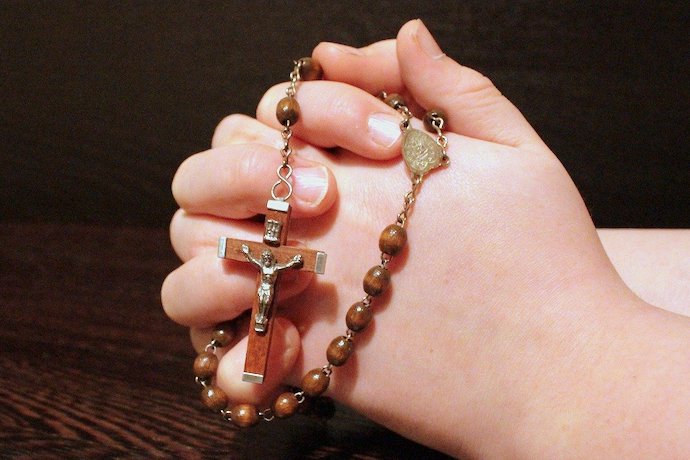According to a Pew Research Center survey in March of this year, 61% of Americans believe that abortion should be legal in most cases. Even so, the US Supreme Court overturned the constitutional right to abortion established in its 1973 Roe v. Wade decision.
No wonder the reaction has been fierce. One Democratic congresswoman, Alexandria Ocasio-Cortez, called for two Supreme Court justices to be impeached for lying under oath during their Senate confirmation hearings. Panicked commentators warn of the end of democracy in the United States. Others blame misogyny and “theatrical masculinity.”
Less attention is paid to one important element in America’s abortion debate: the steady ascendancy in American public life of a deeply reactionary strain of Catholicism. Of course, Catholics are no less divided than anyone else on many issues, including the right to abortion. Liberal Catholics, such as President Joe Biden and Speaker of the House Nancy Pelosi, as well as many of the roughly 50% of Catholics who voted for Democrats, support a constitutional right to abortion. The same is true of Justice Sonia Sotomayor, one of the three liberals on the Supreme Court. But five of the nine Supreme Court justices adhere to an ultra-conservative brand of Catholicism which holds that even an embryo has a soul and thus is sacrosanct.
Samuel Alito, who wrote the majority opinion overturning Roe, cited the seventeenth-century English jurist, Matthew Hale, who considered abortion to be murder (he also believed in witches). Such views are far from the mainstream of contemporary American life. But radical Catholics – for that is what they are – have been a driving force behind the anti-abortion cause for nearly a half-century.
Even conservative Protestants supported the Roe outcome at the time. The Southern Baptist Convention stated in 1973 that “religious liberty, human equality, and justice are advanced by the Supreme Court abortion decision.” And yet, a decade later, evangelical conservatives, fearful that a wave of progressive secularism would threaten such cherished institutions as racially segregated Christian colleges, began to make common cause with radical Catholics. Roe became their rallying point. Their common goal was to break down the wall separating church and state, so carefully erected by the Constitution’s framers.
Some radicals now even claim that the separation of church and state was never actually intended. In the words of Far-right Republican congresswoman Lauren Boebert: “I’m tired of this separation of church and state junk that’s not in the Constitution.”
But things are moving fast. Just days after overturning Roe, the Supreme Court decided that a football coach in Washington state should have the right to conduct post-game prayer meetings at his public high school. This, too, is a break with precedent barring religious expression, as a private matter, from public institutions like schools.
The radicals appeal to “religious freedom.” If a football coach wants to pray at football games, surrounded by players who might not wish to invite his disapproval, he is only exercising his right to free speech and religious belief.
But the separation between church and state, at least in mostly Protestant democracies, such as the US, was meant precisely to defend religious freedom. Whereas the French notion of laicité was intended to keep the Catholic clergy from interfering in public affairs, the US Constitution was devised to protect religious authority from state intervention, as well as vice versa.
One reason why the Protestant elites in the US were suspicious of Catholics until not so long ago, apart from snobbish anti-Irish or anti-Italian sentiment, was the fear that Catholics would be more loyal to their faith, and thus to the authority of the Vatican, than to the US Constitution. That is why in 1960, as he campaigned for president, John F. Kennedy had to stress his belief “in an America where the separation of church and state is absolute, where no Catholic prelate would tell the president (should he be Catholic) how to act…”
What those Protestant elites feared is now a real threat. Catholic radicals and Protestant zealots are actively trying to impose their religious beliefs onto the public realm. Alito, as well as other Catholics, such as former Attorney General William Barr, see secularism as a threat (in Barr’s words) to “the traditional moral order.” That is to say, a strict interpretation of the Christian moral order. Marriage, according to Alito, is a “sacred institution between one man and one woman.” One day – and possibly soon – he may decide to overturn the Court’s seven-year-old decision recognising a federal right to same-sex marriage.
The danger of injecting a religious agenda into politics or law goes further than eroding the autonomy of secular institutions. It makes reasoned political debate impossible. Politics is not value-free, of course. There is nothing wrong with a politician, or indeed a jurist, who believes that religious values matter. But there is a serious problem when religious orthodoxy trumps all other considerations.
The Israeli philosopher Avishai Margalit described this succinctly in his book On Compromise and Rotten Compromises. In “politics as economics,” material interests are “subject to bargaining, everything is negotiable, whereas in the religious picture, centered on the idea of the holy, the holy is non-negotiable.”
This, then, is why politics in the US is now in such a perilous state. More and more, the secular Left and the religious Right are engaged in a culture war, revolving around sexuality, gender, and race, where politics is no longer negotiable. When that happens, institutions start breaking down, and the stage is set for charismatic demagogues and the politics of violence.
The writer is an editor and author. ©Project Syndicate.
